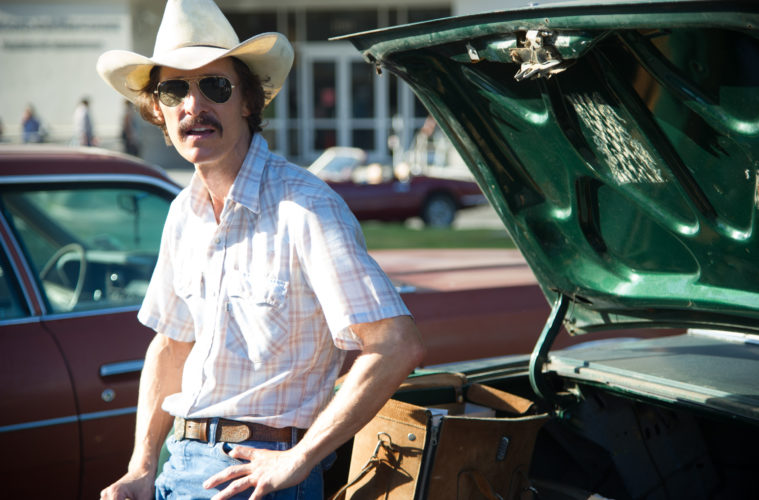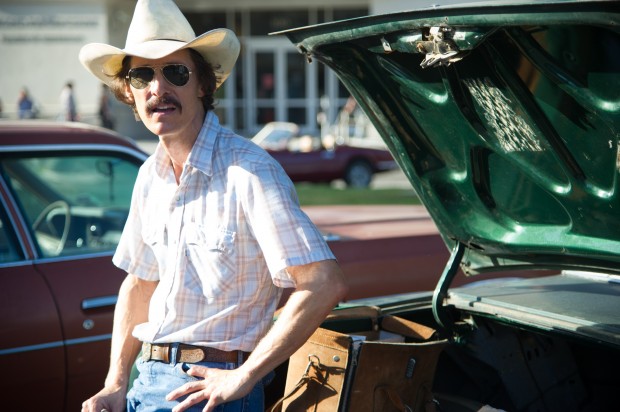
How do you stretch having thirty days left to live into seven years? You put in the work. Ron Woodroff (Matthew McConaughey) didn’t journey towards opening up the Dallas Buyers Club in order to stage a revolution against the FDA — he simply sought to prolong his own life. Director Jean-Marc Vallée’s film depicts this evolution as Woodruff’s homophobic cowboy becomes a champion of the LGBT community and a leader in the fight against government AIDS profiteering. It’s a story twenty years in the making as screenwriter Craig Borten met with the real Woodruff a month before his death in 1992, enlisted Melisa Wallack’s help to rework his script in 2000, and finally saw its debut at the 2013 Toronto International Film Festival. And it proves much more than a vehicle for the headline grabbing weight loss of its stars, as we said in our review from the festival.
We got a chance to sit down for a roundtable interview with McConaughey following the TIFF premiere of the project, where we discussed how he had this project in his sights for some time. The actor, who is enjoying a career resurgence as of late and is currently in the middle of shooting Christopher Nolan‘s Interstellar, also opened up about how he got into acting in the first place and how constructive negative reviews help his work and much more. Check out the complete conversation below.
Can you talk about how this project engaged you in the first place?
Well, I read it probably three years before we made it and I just remember writing down that this thing has fangs. I’ve written before about scripts I like. With True Detective I wrote, “oooh, the blood comes off the page.” So after I would finish a film I would always ask, “well, what about this one next?” But it never was really working out, but I would always keep it right there at the top of my desk. I thought it was an incredible original story. This guy and what he did: 7th grade education, big cowboy, bull-riding, electrician, hell-raising, womanizer, heterosexual gets HIV, 30 days to live and within 7 years becomes an absolute scientist of HIV. The guy from that education, from that background who goes on his own and does his own research and knows more about the disease and the cocktails of how to sustain a healthier life, longer, and did that on his own — that renegade, that outlaw who knows as much or more than most of the doctors; I thought that was a great story.
It looks like you are getting back to the size that we know you. Are you back on the way up in the weight gain?
I’ve been holding this weight, 175, for the past 3 months. I usually walk around at 182.
How difficult was it?
I got with a nutritionist and found out how many calories and what the meals were going to be. And once I controlled those and said, “No, I’m not going to meet you at the steak house” and had my plan and had a family that had those meals prepared for me. I didn’t want to go to a buffet and pick out things, no controlled meals. Once I had those set up and had my timeline those became pretty easy.
How much did you lose?
47.
What exactly where you eating when you got down to the 135?
More than you think. I was eating pretty damn healthy, just small amounts. 5oz of fish with lunch with a cup of vegetables. I was having meals and by that time my body knew — it got the message that I wasn’t going to feed it anymore. Then it felt like it started losing weight on its own, because once I got to the weight that I wanted to get to and i didn’t want it to go any lower, I started to eat more to plateau out, but my body kept losing weight.
What would you do if you knew you only had 30 days to live?
[Laughs] I knew that question would come at some point. I don’t know right now, but I’m sure when you read that on the script that’s the first thing that comes to mind. I thought what would Ron think of that? The first thing that Ron did and how he approached it was absolute denial. Number one [was] “no, I don’t have it, I cant have it. You don’t know what the F you are talking about,” you know? That was where Ron was coming from and then it slowly creeps in. He goes the first night and parties hard, but something is nagging at his mind. Then he goes and does his research and says, “oooh, I think I know where I got it.” And the real desperation and fear doesn’t hit him until he is on that drive down to Mexico and I think that’s when it hits him — is this true? And then that great emotion that causes more activity than any other emotion; I think it’s the emotion which helps a lot more people live a lot longer-rage, absolute rage.
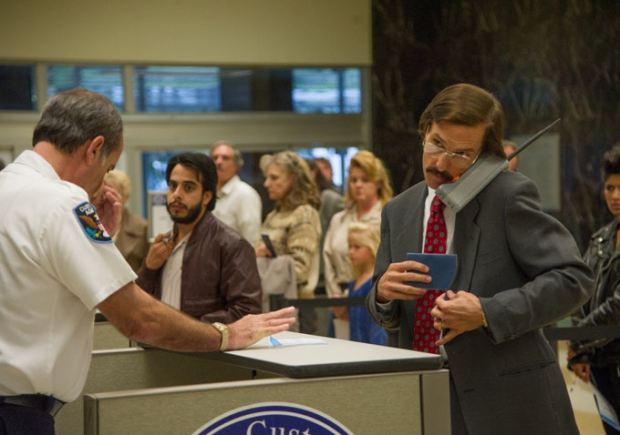
How difficult do you think it was for Ron, to be a man with full-blown aids, in Texas?
Well, at that time it wasn’t just Texas, it wasn’t just the south. A heterosexual with aids? There wasn’t many people believing, that maybe you weren’t heterosexual. Shoot, that suspicion is still there today. Doctors didn’t know what to do with it. There were all kinds of ideas and conspiracy theories about what is was and where it came from who had it, who could get it. So no one had the answers, nobody in any part of the county was completely sure. There was info being thrown around. I was 16, so I don’t remember it that clearly. Magic Johnson came out with it and there were players saying, “no I’m not going to play on the same court” — they had a legitimate beef, no one knew. They didn’t know if you could get it from a handshake. They’d say you can look that person in the eye and get it. There were all sorts of taboo and superstitions about it and nobody came out with research on it, like here is the doctrine, here’s what’s true, here’s what’s not true. It was all wish-washed. You can get it from saliva, you can get it from swapping sweat, you know you can get it from blood — if you got a cut and it flew through the air and got caught in your eye. No one could answer those and that wasn’t just in the south or Texas.
It was also in the time in the ’80s, when you might have decided you wanted to become an actor.
Well no, I didn’t decide to become an actor at that time. I was a sophomore. I had just got my driver’s license, that’s what I was happy about. I got my driver’s license and saved up enough money to get my first truck.
You wanted to be a lawyer first, right?
Yes. I had finished high school, moved to Australia for a year to become an exchange student because I wasn’t sure what I wanted to do. I washed a few dishes, but I didn’t get paid for washing dishes. I had 11 jobs and that wasn’t one of them, I did that at the houses where I lived though. Like any kid at 18 I didn’t know what I wanted to do and my mom had this great idea about traveling. She knew I loved to travel, so I went to Australia for a year, came back, and went to the University of Texas. I was headed towards law school and it wasn’t until the end of my sophomore year, right about that time when your general credits are up and your new ones aren’t really going to transfer if you change your course schedule. I was a little nervous about this idea of being a lawyer.
At that time I was saying to myself, “I want to go into the storytelling business” and probably as I look back and I have looked back at my diaries from back then, I was more interested in acting than I was consciously saying to myself. It was not something that was even in the vernacular of my dreams, I didn’t think that it was tangible enough. I was coming from a place where you get a job, you work your way up in whatever structure that is, and so I went to film school, to study behind the camera. Even then I didn’t want to be an actor, but as I look back, even when I would direct I would get over there and show the person what I wanted them to do. So I was kind of performing then and I was enjoying it. It wasn’t until that summer, in ‘92 between my junior and senior year, that I was in the right bar at the right time. Well, that was the guy who brought me in to meet [Richard] Linklater for Dazed and Confused.
Who was that producer?
Don Phillips, the legendary Don Phillips. Don cast Fast Times at Ridgemont High, Melvin and Howard, and he cast that film.
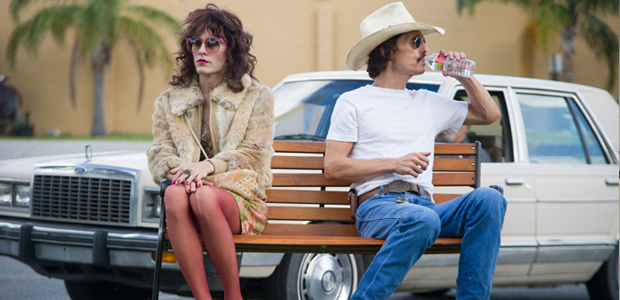
So you’ve never stopped working, yet in the past few years something has happened. I’m going to say in my eyes it started with Tropic Thunder. What are you doing, if anything, differently?
I’m going for more experiences. My choice making, period. What’s the experience going to be for me, what sort of experience am I going to have? I’m sure you’ve heard me say this before but I say, “alright, I want something that’s going to scare me a little bit that I’m not sure what I want to do with it, but, boy I can’t get it out of my mind.” That’s one way to explain it, but also I’m going for more experiences.
Was Tropic Thunder something that was different for you?
Tropic Thunder was a different kind of comedic role. It was fun to play a character and not characterize it, but it’s a little of that. There’s a character there, it’s not me being funny. It’s a character and hopefully being funny and I really like comedy. I am really turned on by comedy. I think it’s really fun and I like the timing of comedy. And that was sort of a fictitious guy they said it was based on, but it was fun playing with the imagination.
I’m sure you like getting good reviews.
Well, sure. There’s constructive good reviews and there’s constructive bad reviews. There’s bad reviews where they wrote the bad review before they even saw it, they just didn’t like me. I’ve read all my bad reviews, and got them all out a few years ago. It’s a big file and I read them all.
Which one helped you?
Well, there was one, I remember particularly, about Edtv. Because Edtv came out and didn’t do so well in the box office, but that movie stands on its own and worked in a lot of ways. As you all know, if it doesn’t do well in the box office, people will say, “oh, well here is why.” If it does then they say, “oh, and here is why.” There were some reviews at the time where people would say, “this is where I think McConaughey was true and good and funny,” or “this is where he wasn’t,” and I would go back and compare. I would look at diaries and see what did I think I was doing, compared to what I actually did, compared to what got edited — there is always a gap between those things and the goal is to close those gaps. That’s why actors go into producing, because they want complete control. I’ve got some constructive criticism along the way where I’m like, “he’s right, good point.”
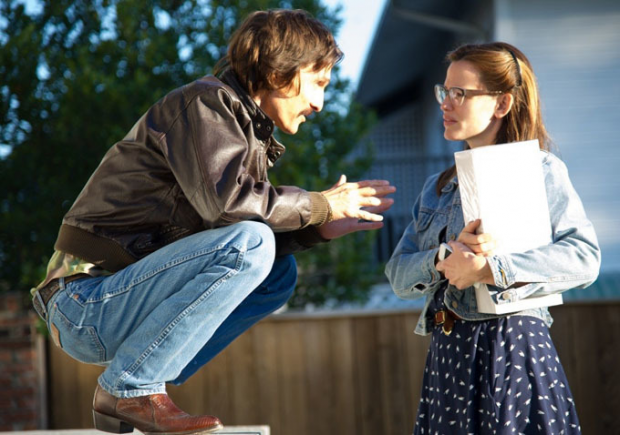
Dallas Buyers Club hits theaters on Friday, November 1st.

